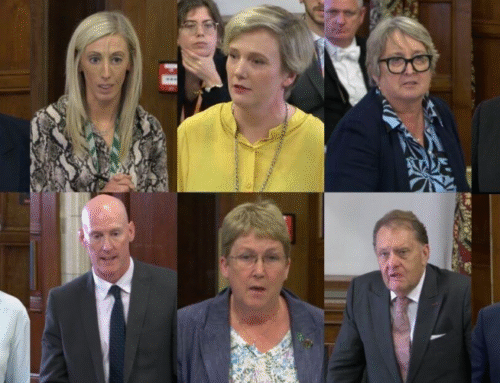
“A fat pope follows a thin pope” is a Roman adage that is frequently applied in choosing the archbishop of Canterbury — the spiritual leader of the world’s third largest Christian communion.
The axiom is applied to explain how Roman Catholic cardinal-electors are wary of a single perspective dominating the Church for too long, and therefore are more likely to vote for a pope who is different from his predecessor.
The Church of England adapts this maxim to mean that those in the corridors of power will appoint an evangelical archbishop of Canterbury to succeed a liberal predecessor, or vice-versa. In recent decades, Robert Runcie (liberal) was succeeded by George Carey (evangelical) followed by Rowan Williams (liberal).
So when Justin Welby was appointed to succeed Williams, Anglican clerics committed to biblical truth and the Gospel were singing the “Hallelujah Chorus” from every cathedral steeple in England. I joined in singing with a muted fortissimo because I had worked as canon theologian at Liverpool Cathedral under Welby, who was my dean (as I detailed for The Stream on Monday in Part 1).
Ambition and Deception
For all his weaknesses, Welby had never abandoned his firm footing in evangelicalism — and at a time when the Church of England was being pushed to normalize homosexual relationships, my old boss would act like David and slay the Goliath of the Gay Gospel with the sling of biblical truth.
But in the end, Welby turned out to be more like Saul. If I were to write a counter to John F. Kennedy’s great book, Profiles in Courage, titled Profiles in Cowardice, my first chapter would feature Welby. The failure to act with boldness in the case of Anglicanism’s most prolific abuser, John Smyth (see my Nov. 14 news story in The Stream) led to Welby’s resignation. Like Saul, he died by falling on his own sword.
In his commentary on 1 and 2 Samuel, V. Philips Long summarizes Saul’s problem: “The heart of his failure is his neglect of the word of Yahweh. Saul obeys up to a point, but that is the problem. He obeys only up to the point at which other concerns begin to carry more weight.” Like Saul, Welby is a tragic hero – a complex person driven by political ambition and self-deception.
Wobbly Welby
In a 2017 column I coauthored with Kathy Gyngell, coeditor of The Conservative Woman, we crowned the archbishop with an epithet that became hugely popular in Anglican circles. We called him “Wobbly Welby.”
“Since his consecration, His Piousness the Grand Panjandrum of Canterbury has managed to apologise to most of the Church’s secular critics as well as to its entire vocal victim group discontents therein,” we wrote.
On this occasion, Welby was apologizing for the Reformation and those put to death for opposing it. Needless to say, there was no reciprocal remorse expressed by the Roman Catholic hierarchy for burning at stake Catholic priests like Jan Hus or William Tyndale, thousands or Cathars or Hugenots, or for that matter, for officially endorsing the torture of “heretics” as prescribed by Pope Innocent IV in his bull Ad extirpanda (1252).
Welby was widely mocked by both the secular press and Anglican faithful with former conservative Catholic parliamentarian Ann Widdecombe, remarking: “The Archbishop has not put anyone to death, as far as I know. Modern Christians are not responsible for what happened in the Reformation. You might as well expect the Italians to apologise for Pontius Pilate.”
So Many Apologies, So Little Time
“Wobbly” Welby would issue a whole series of apologies in his career: He had earlier bizarrely apologized for Britain’s bombing of the Nazis in Dresden (he later apologized for apologizing). He also apologized for Britain’s colonial administration firing on a crowd at Amritsar in India in 1919, killing 379 protestors. Welby was ridiculed for physically prostrating himself at the memorial.
Black clerics accused Welby of “utter hypocrisy” when he backed the Marxist-led Black Lives Matter movement but refused to lift a finger to investigate how the hierarchy had blocked them from progressing in the church.
In 2023, Welby issued the mother of all apologies by agreeing to compensate the descendants of black people for having been enslaved six to 10 generations ago to the tune of 100 million pounds from the Church of England’s rapidly emptying coffers.
By this time, Welby had long completed the pilgrimage from “wobbly” to “woke” and had begun to preach the new gospel of identity politics and faux victimhood. In 2021, he had already begun a new iconoclastic movement by ordering the Church of England to review thousands of statues and monuments in its churches to ensure that any with links to slavery would be removed.
When Canterbury Cathedral refused to comply, historian Dr. Ben Marsh commended it, saying: “Most professional historians would like to see full contextualization. That’s what good history is about. It’s not about judging.”
Worsening Wokeness
In a 2014 interview with Pink News, the archbishop praised the recently introduced UK “same-sex marriage act,” calling it “right and proper,” adding: “It’s the law of the land, and that’s great.” Under his leadership, the Church of England approved same-sex blessings on an “experimental” basis for a period of three years and then went on to permit same-sex civil marriages of its clergy.
Anglicans in Asia and Africa fought a long battle against Welby’s LGBT+ crusade, but were derided and dismissed. Just days before his resignation, the Global Fellowship of Confessing Anglicans (GAFCON) primates sternly rebuked the archbishop for promoting the “teaching of Jezebel” which “endorses sexual immorality.”
The archbishops were responding to Welby’s interview on The Rest is Politics show, in which the archbishop said that all sexual activity within a committed relationship “whether it’s straight or gay” is fine.
“We’ve put forward a proposal that where people have been through a civil partnership or a same-sex marriage, equal marriage under the 2014 Act, they should be able to come along to their local, to a church, and have a service of prayer and blessing for them in their lives together,” Welby stated.
The primates declared Welby guilty of heresy. “While he may claim not to have changed the doctrine of marriage, the Archbishop of Canterbury has demonstrably changed the doctrine of sin, by promoting the sanctification of sin by means of a divine blessing,” they said.
Welby stood by his Church’s transgender recommendations to its 4,700 schools across England in 2017 permitting boys as young as five to wear tiaras and tutus or high heels to school. Girls should be able to wear a tool belt and fireman’s helmet if they choose, the document said, since “childhood has a sacred space for creative self imagining.”
One of the saddest episodes in the Welby saga is his almost rabid glee in closing churches (even before the government could order a shutdown) and coercing his flock to take the abortion-tainted vaccine during the COVID-19 pandemic. Priests were not permitted to pray or celebrate the Eucharist, even by themselves, in empty church buildings.
“So I would say yes, to love one another – as Jesus said – get vaccinated, get boosted,” the archbishop told ITV News, suggesting that those who don’t get vaxxed are “immoral.”
Abortion and Antisemitism
When asked his view on buffer zones around abortion clinics — which would involve charging pro-life demonstrators who cross into them with a criminal offense — Welby waffled: “Whatever you think about abortion, they’re human beings. You could say they’re doing the wrong thing; you could say they’re doing the right thing.
“But how do we love the people who are going there, treat them as human beings, and value and respect them?” he asked, refusing to condemn abortion or the anti-free speech law on buffer zones.
Ironically, the same archbishop has also spent years cozying up to hardline Muslims, even hosting ultra-homophobic, Iran- and Hamas-supporting Mohammad Ali Shomali and Mohammed Kozbar for a quintessentially English tea party.
Unsurprisingly, the archbishop has ferociously attacked the Jewish state of Israel. In August, he even released a statement welcoming the International Court of Justice’s Advisory Opinion on Israel’s presence in Judea and Samaria. Welby called it “unlawful” and accused Israel of “systemic discrimination” against the Palestinians.
In response, more than 20 Christian leaders representing a variety of ministries in the UK with links to the Middle East united to condemn the legal opinion the archbishop promoted as “biased, uninformed, naive, and ultimately unbiblical.”
“Welby is wokeness personified. It sometimes feels like he has greater fealty to the god of PC than to the God of Christendom,” Brendan O’Neill wrote in his Spiked column. “How striking that he showed more vim and interest when apologising for crimes that happened long before he was born than he did for crimes committed by a man he knew in an institution he now leads.
“This is the moral fashion: to pontificate over a past we can do nothing about in an attempt to distract us from a present we feel we cannot fix,” O’Neill explained. “It’s the hubris of woke, where one makes loud, pseudo-virtuous cries about unchangeable history in lieu of having any solutions for the here and now.”
A Sad End
Welby will go down in ecclesiastical history as the first archbishop of Canterbury who was forced to resign. We may well uphold him as the paradigm of a Christian leader who suffers from the Icarus syndrome.
In the Greek myth of Icarus who gets wings of wax and feathers, Icarus’s father warns his son “to take the middle way, in case the moisture weighs down your wings, if you fly too low, or if you go too high, the sun scorches them. Travel between the extremes … take the course I show you!”
Icarus is so intoxicated by his hubris that he flies higher and higher, and as he comes near the sun, the wax holding his feathers melt and his wings fall apart. Icarus plummets at great speed into the sea and is drowned.
If only Welby had heeded his Master’s advice: “The greatest among you will be your servant. For those who exalt themselves will be humbled, and those who humble themselves will be exalted.”
Dr. Jules Gomes, (BA, BD, MTh, PhD), has a doctorate in biblical studies from the University of Cambridge. Currently a Vatican-accredited journalist based in Rome, he is the author of five books and several academic articles. Gomes lectured at Catholic and Protestant seminaries and universities and was canon theologian and artistic director at Liverpool Cathedral.
The post The Rise and Fall of ‘Woke Welby,’ The Arch-Virtue Signaler of Canterbury (Part 2) appeared first on The Stream.
Subscribe Below To Our Weekly Newsletter of our Latest Videos and Receive a Discount Code For A FREE eBook from our eBook store:





